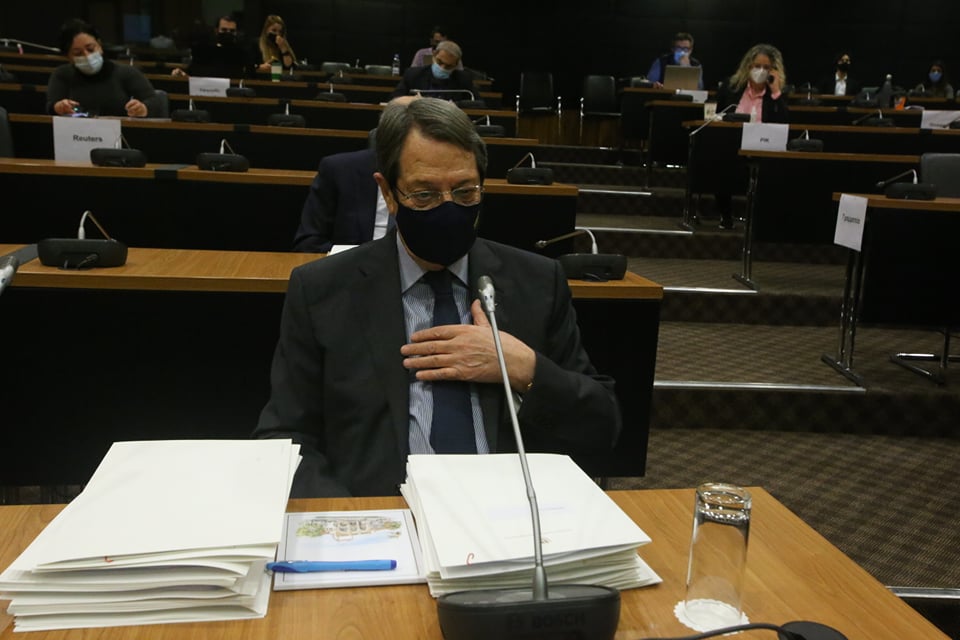Opposition parties appear determined to keep their campaign against what they view as government corruption going for as long as they can. What is worse for the government is that these attacks are focused on President Anastasiades, who has not made things any easier for himself with his rather unconvincing efforts to defend himself.
The address to the people was nothing more than an excuse to refute the allegations made against him by a journalist – allegations based on gossip and conjecture that drew a categoric denial by the former prime minister of Greece. The announcement of the anti-corruption policies did not seem to impress anyone, while his appearance before the investigative committee on Tuesday was not as convincing as he may have thought it would be. To cap it all, the issue of his family travels to the Seychelles aboard a private jet was the subject of a House committee meeting on Thursday and gave more ammunition to Akel and Diko for their onslaught as the answers given by the cabinet secretary seemed intended to confuse rather than inform.
Diko leader Nicolas Papadopoulos issued a statement claiming Anastasiades had “not told the whole truth.” And if it were shown that the president had traveled free of charge or on favourable terms, then he would have committed perjury because he had told the Nicolatos investigative committee that he had paid for the trip himself, said Papadopoulos. The Akel spokesman Stefanos Stefanou, said it would be “politically and morally correct for the president to take the responsibility for receiving a gift (from the Saudi Arabian owner of the private jet) instead of he and his associates trying to muddy the waters.”
The damage-limitation exercises by the government spokesman that have become a daily feature of political life are not making the slightest difference as they are simplistic denials. On Friday Kyriakos Koushos said the accusations were “unacceptable and groundless” adding that the president “has nothing to hide either from the House watchdog committee, either from the investigative committee or the Cypriot people.” Such assertions will not bring the matter to a close because a lot has happened, with the allegations against Anastasiades accumulating over the years.
His public standing is at the lowest point it has been, during the eight years of his presidency and it is not because of Diko and Akel’s onslaught. Their attacks are pandering to the public’s disillusionment with the government, a reflection of people’s growing discontent that followed the Al Jazeera documentary and subsequent revelations about the citizenship scheme. Add to this the talk about his preference for a two-state solution to the Cyprus problem, which may have endeared him to a section of the population but angered another section that now feel they were deceived for years and that Anastasiades had calculatingly spurned the opportunity of a reasonable settlement at Crans-Montana.
The president seems to be in limbo with no idea of how to restore his credibility and regain people’s confidence. Everything he has tried so far to counter the barrage of criticism has not just failed, but it has given the impression of a president, who is much more interested in protecting his public image than taking full responsibility for his actions and moving on. He seems to be spending most of his time on how to deal with criticism than on running the country, which is going through a very difficult time, as Koushos himself noted on Friday in responding to Akel and Diko.
The president and the government, said the spokesman, “will remain committed to the creation of climate of unity in view of serious developments in the national issue, dealing with the pandemic and its economic consequences and will not follow the path of heightening the toxicity, desired by Akel and Diko.” Rather than waste his time pursuing an unattainable objective like unity, Anastasiades should try to provide some leadership in view of the serious issues facing the country and stop obsessing about his tarnished public image and protesting that it is undeserved. The reality is that he cannot fix it by engaging in daily exchanges with the opposition or giving televised addresses to complain about the bad publicity.
Bad publicity is part of the president’s job and after eight years in the job Anastasiades should have learnt to deal with it. He has two years left in office and should not waste them trying to rebuild his reputation and standing through communications tricks. He would have more chance of achieving goal this by ignoring the bad press and focusing on running the country in these testing times.







Click here to change your cookie preferences